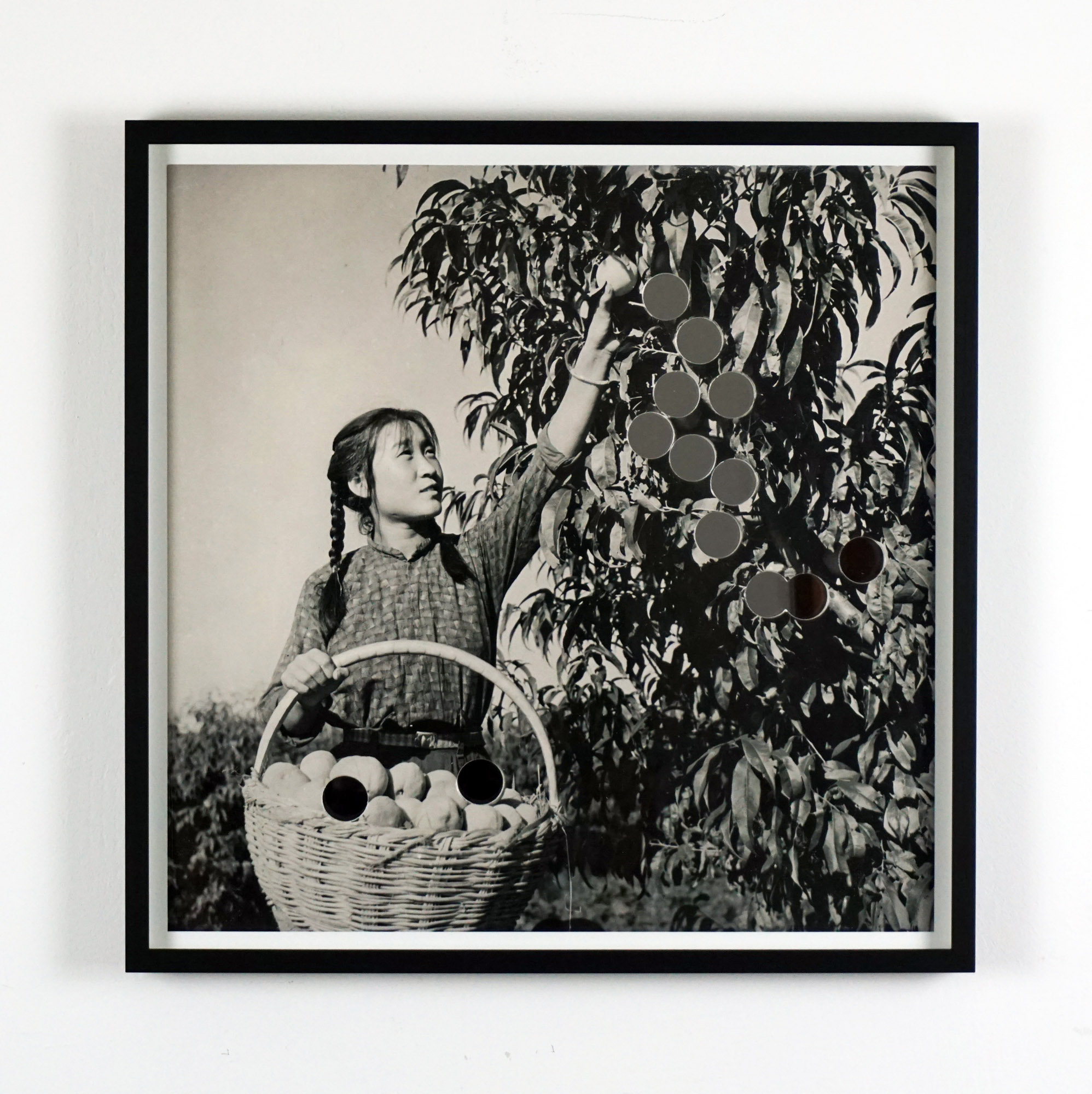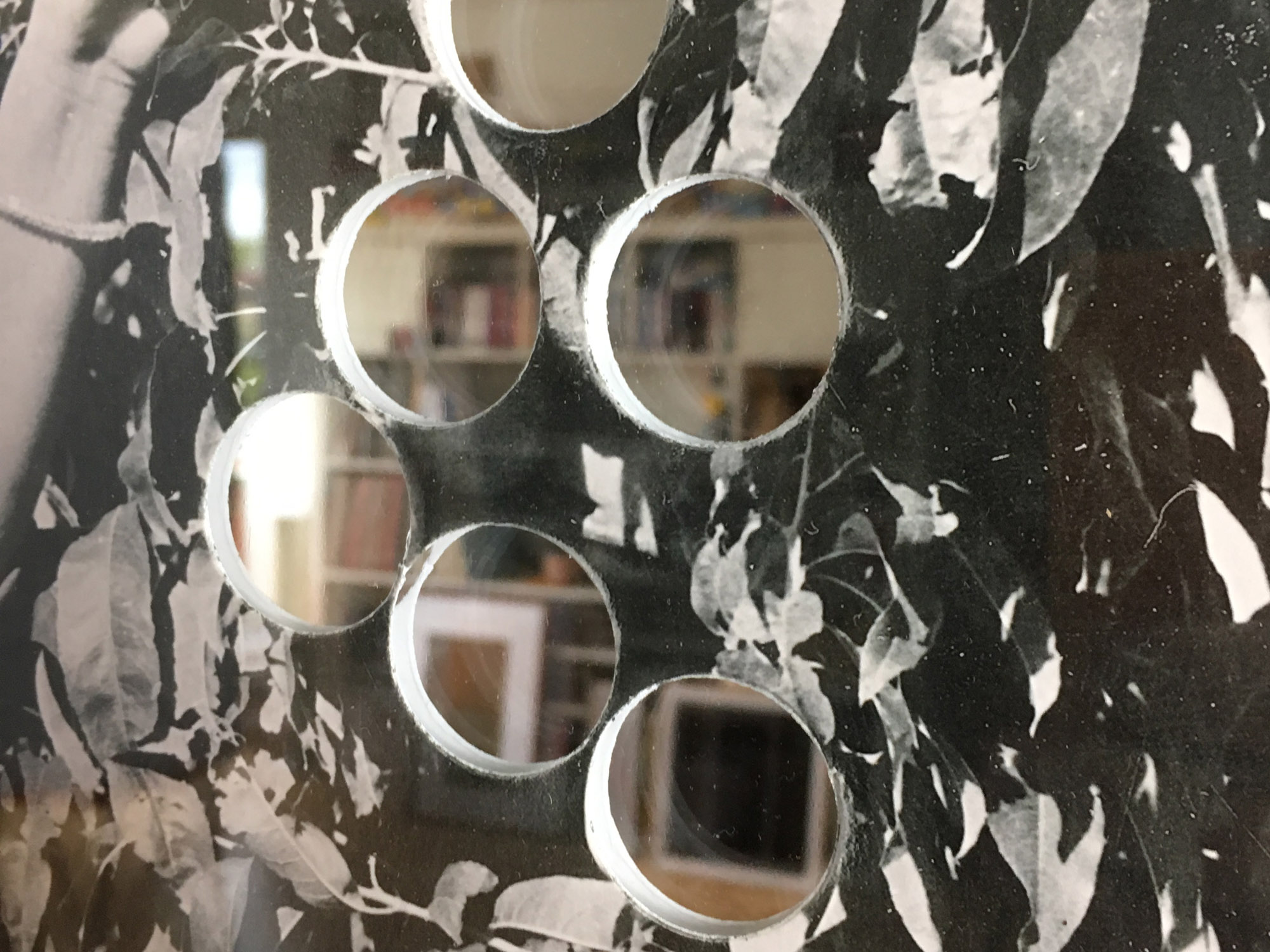Cai Dongdong
Geboren 1978 in Tianshu, China, lebt in Beijing, China
Pick the fruits, 2017
Archival Fine Art Print auf Hahnemühle Fine Art Baryta 325g, gestanzt, Acrylspiegel
45 x 45 cm
Auflage: 50 (12 EA)
signiert, nummeriert auf Aufkleber mit begleitendem Zertifikat
950 €
︎ Anfrage / request
versandkostenfrei in Deutschland, EU 30€
free shipping in Germany, 30 € in EU
mehr lesen / read more
Für Cai Dongdong (geb. 1978 Tianshu, Gansu, lebt und arbeitet in Beijing), der während seiner Militärzeit in der Volksbefreiungsarmee trotz fehlender Erfahrung jahrelang als Porträtfotograf eingesetzt wurde, bleibt die Fotografie das wesentliche Ausdrucksmittel seiner Kunst. Er setzt sich mit dem traumatischen Erbe der chinesischen Kulturrevolution auseinander, insbesondere mit der politischen Indoktrinierung der Jugend, deren Bildung auf körperliche und produktive Arbeit reduziert wurde.
Er seziert sie auf der Suche nach „verborgenen“ Inhalten, um sie dann mit eingefügten Objekten zu verfremden. Häufig sind es Spiegel, mittels derer er unterschiedliche Effekte und Bedeutungen erzielt, z.B. den Protagonisten der Bilder denselben vorzuhalten und das eigene Handeln zu reflektieren. Ein anderes Mal zieht er den Betrachter unmittelbar in das Geschehen hinein, holt es somit in die Gegenwart und bringt eine weitere Ebene ins Spiel - die Auseinandersetzung mit der zeitgenössischen Kunstproduktion und ihrer Mechanismen. „When we are a visitor looking in the mirror, it’s like we’re burying our own images” konstatiert Cai Dongdong.
Das Vorbild zu unserer aktuellen Edition „Pick the Fruits“, die in Zusammenarbeit mit der Gesellschaft für Deutsch-Chinesischen kulturellen Austausch e.V. herausgegeben wird, stammt aus einer Serie, die Cai Dongdong 2015 unter dem Titel „Fountain“ in einer New Yorker Ausstellung und als Buch (Jiazazhi Press Beijing, China) publiziert hat. Der Titel bezieht sich auf Marcel Duchamps berühmtes gleichnamiges Schlüsselwerk in Form eines handelsüblichen Urinals. Bezeichnenderweise existiert es nur als Fotodokument und steht paradigmatisch für die den Dingen innewohnende Mehrdeutigkeit und deren manipulierbare Rezeption. Arbeiten des international gezeigten Künstlers sind in Deutschland u.a. aus der vielbeachteten Ausstellung „China 8“ (2015) bekannt und derzeit im Rahmen der Ausstellung „Working on History, Contemporary Chinese Photography and the Cultural Revolution“ im Museum für Fotografie, Berlin (bis 07. Januar 2018) zu sehen.
During his time in the People’s Liberation Army, Cai Dongdong, despite his lack of experience, was deployed as a portrait photographer. And photography has remained his art’s essential means of expression. He takes up the traumatic legacy of China’s cultural revolution, particularly as concerns the political indoctrination of the young, whose education was namely reduced to physical and productive labor.
Cai has no wish to shoot even more photos but avails himself of the pool of historical photographs and his own commissioned works. These he dissects in a search for “hidden” contents and then defamiliarizes them with inserted objects. Frequently these are mirrors, by which he engenders different effects and meanings. For example, he holds the same images up to the pictured protagonists so they can reflect on their own conduct. Another time he draws the viewers themselves into the goings-on. This brings it all into the present and adds a further level: a reckoning with contemporary art production and its mechanisms.
The model for our current edition, “Pick the Fruits”, that is being issued in collaboration with the Society for German-Chinese Cultural Exchange, is extracted from a series called “Fountain” that Cai Dongdong published in 2015 to accompany an exhibition in New York and also as a book. The title is a reference to Marcel Duchamp’s famous key work of the same name in the form of a commercially available urinal. It continues to exist characteristically only as a photo document and stands as a paradigm for the innate equivocation of things and their reception, which are subject to manipulation.
Works by this artist at international exhibitions in Germany can be seen, among other places, in the much discussed show “Working on History: Contemporary Chinese Photography and the Cultural Revolution” at the Museum für Fotografie in Berlin until 7 January 2018.


